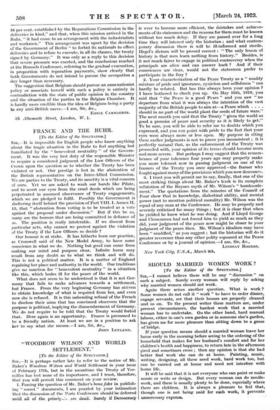FRANCE AND THE RUHR.
[To the Editor of the SPECTATOR.]
Sin,—It is impossible for English people who know anything about the tragic situation in the Ruhr to feel anything but humiliated by the " benevolent neutrality " of the Govern- ment. It was the very first duty of the responsible Minister to require a considered judgment of the Law Officers of the Crown upon the question as to whether the Treaty has been violated or not. Our prestige is lost in the abstention of the British representative on the Inter-Allied Commission. We are parties to the Treaty, and its sanctity is a vital concern of ours. Yet we are asked to wash our hands like Pilate, and to avert our eyes from the cruel deeds which are being perpetrated in assumed observance of Treaty engagements, which we are pledged to fulfil. Possibly the Government is dickering itself behind the provision of Part VIII. I. Annex II. 13, that " abstention from voting is to be treated as a vote against the proposal under discussion." But if this be so, many are the horrors that are being committed in defiance of us. The position is really intolerable. If we dissent from particular acts, why cannot we protest against the violation of the Treaty if the Law Officers so decide ?
Our honour is at stake. It has hitherto been our practice, as Cromwell said of the New Model Army, to have some conscience in what we do. Nothing but good can come from making our mind and purpose clear. Infinite harm may result from any doubt as to what we think and will do. This is not a political matter. It is a matter of England regaining her place and authority in the world. Our traditions give no sanction for " benevolent neutrality " in a situation like this, which bodes ill for the peace of the world.
What does not seem to be understood is that it is not Ger- many that fails to make advances towards a settlement, but France. From the very beginning Germany has striven to obtain knowledge of what is required from her, and even now she is refused. It is this unbending refusal of the French to disclose their aims that has convinced observers that the purpose is political, implying the dismemberment of Germany. We do not require to be told that the Treaty would forbid that. Here again is an opportunity. France is presumed to be a friendly nation. At least we are in a position to ask her to say what she means.—I am, Sir, &e.,
Jona: LEYLAND.


































































 Previous page
Previous page